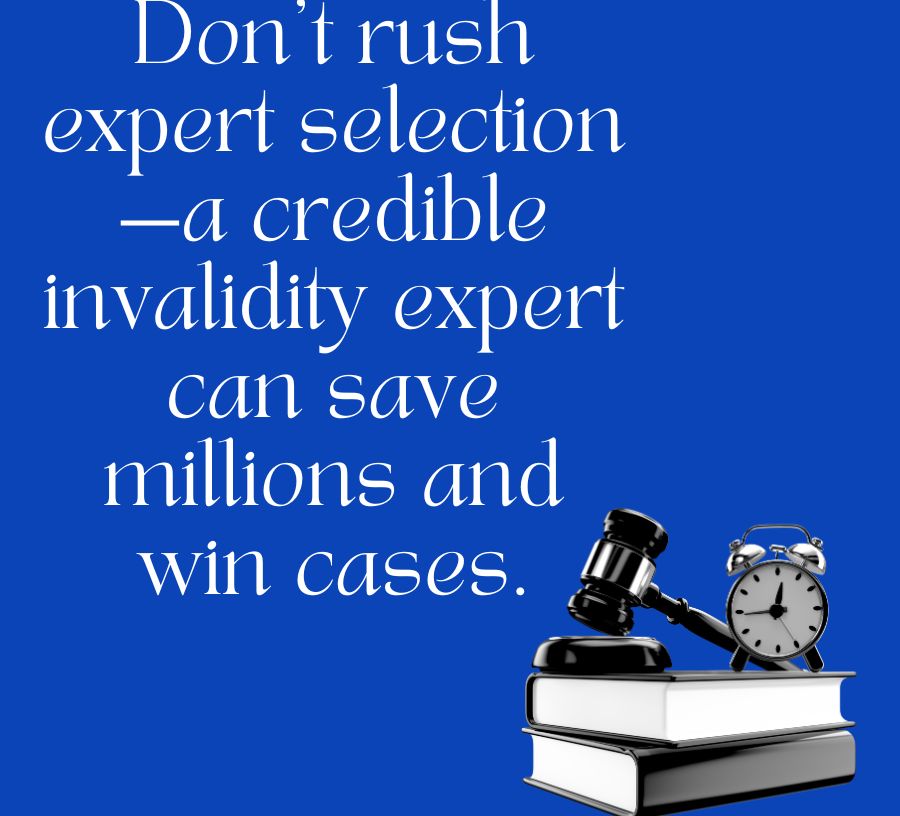
Litigation success hinges on credible, detailed analysis, particularly in intellectual property and patent disputes. Picture this: an attorney handling a critical patent case struggles to establish a strong invalidity claim because their expert’s analysis fails to withstand scrutiny. The result? A weakened argument and a potential loss. This scenario underscores the necessity of invalidity expert analysis—a decisive factor in proving or disproving the validity of a patent, shaping the outcome of high-stakes cases.
At the core of patent disputes lies the question of validity. Invalidity expert analysis serves to challenge a patent’s enforceability by:
Legal teams depend on experts to provide:
A well-prepared invalidity expert not only strengthens your argument but also resists challenges under cross-examination, ensuring their testimony remains credible and admissible.
Without a qualified invalidity expert, attorneys risk missing prior art crucial for invalidating a patent. Comprehensive knowledge of prior inventions, publications, and patents is essential for presenting a strong case.
Inconsistent or poorly executed analysis can result in testimony being dismissed under legal standards like the Daubert rule, severely damaging the case.
Complex technical jargon can alienate judges and juries. Without an expert skilled in simplifying technical details, your argument might fail to resonate with decision-makers.
A case lost due to insufficient or inadmissible expert testimony not only damages client trust but also incurs significant financial and reputational costs for the law firm.
An effective invalidity expert must have:
Attorneys should vet experts by reviewing:
A top-tier invalidity expert bridges the gap between technical complexity and courtroom understanding by:
Engage your expert early in the case to develop a robust strategy that integrates their findings into your legal arguments. Allow ample time for thorough research, analysis, and report preparation.
Before trial, conduct mock cross-examinations and request preliminary analyses to identify weaknesses or inconsistencies in their approach. Ensure their testimony aligns with the overall litigation strategy.
Partnering with services like ExpertConnect Litigation Support offers distinct advantages, including:
A multinational corporation was accused of infringing on a software patent related to data encryption. The company’s defense hinged on proving the patent’s invalidity by demonstrating that the claimed technology was not novel.
The defense team engaged a seasoned invalidity expert with experience in cryptographic algorithms. This expert:
The court ruled in favor of the defendant, finding the patent invalid based on the expert’s testimony. This decision saved the company millions in potential damages and reinforced the importance of specialized invalidity expert analysis in litigation.
Under tight deadlines, law firms may settle for an expert with inadequate qualifications. Proper planning and use of expert witness support services can mitigate this risk.
Even perceived biases can damage your case. Conduct thorough background checks to ensure the expert’s neutrality.
While budget constraints are a concern, opting for a less experienced or less credible expert may cost more in the long run if their testimony is excluded or discredited.
Ensure that your expert employs rigorous, court-approved methodologies to strengthen the admissibility of their findings.
Navigating the complexities of expert witness selection becomes significantly easier with professional support services like ExpertConnect Litigation Support. These services provide:
From pre-trial preparation to in-court testimony, expert witness support services ensure that:
Invalidity expert analysis is a cornerstone of successful patent litigation. Choosing the right expert—one with technical expertise, legal acumen, and strong communication skills—can make all the difference in court. By following a rigorous selection process and leveraging the resources of expert witness support services like ExpertConnect Litigation Support, attorneys can confidently build a winning strategy.
Visit ExpertConnect Litigation Support today to explore their network of vetted invalidity experts, and ensure your case is supported by the best professionals in the field of Invalidity expert analysis.